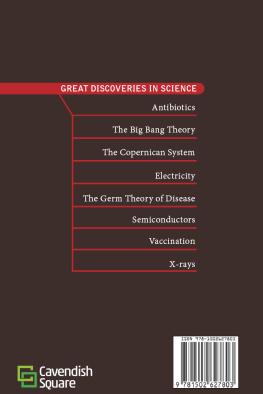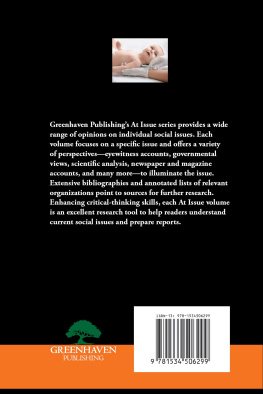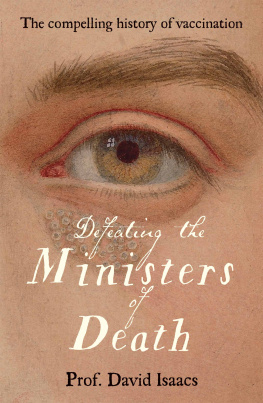GREAT DISCOVERIES IN SCIENCE
Vaccination
Erik Richardson
Published in 2018 by Cavendish Square Publishing, LLC
243 5th Avenue, Suite 136, New York, NY 10016
Copyright 2018 by Cavendish Square Publishing, LLC
First Edition
No part of this publication may be reproduced, stored in a retrieval system, or transmitted in any form or by any meanselectronic, mechanical, photocopying, recording, or otherwisewithout the prior permission of the copyright owner. Request for permission should be addressed to Permissions, Cavendish Square Publishing, 243 5th Avenue, Suite 136, New York, NY 10016. Tel (877) 980-4450; fax (877) 980-4454.
Website: cavendishsq.com
This publication represents the opinions and views of the author based on his or her personal experience, knowledge, and research. The information in this book serves as a general guide only. The author and publisher have used their best efforts in preparing this book and disclaim liability rising directly or indirectly from the use and application of this book.
CPSIA Compliance Information: Batch #CS17CSQ
All websites were available and accurate when this book was sent to press.
Library of Congress Cataloging-in-Publication Data
Names: Richardson, Erik.
Title: Vaccination / Erik Richardson.
Description: New York : Cavendish Square, 2018. | Series: Great discoveries in science| Includes index.
Identifiers: ISBN 9781502627803 (library bound) | ISBN 9781502627810 (ebook)
Subjects: LCSH: Vaccines--Juvenile literature. | Vaccination--Juvenile literature.
Classification: LCC RA638.R534 2018 | DDC 614.47--dc23
Editorial Director: David McNamara
Editor: Caitlyn Miller
Copy Editor: Michele Suchomel-Casey
Associate Art Director: Amy Greenan
Designer: Lindsey Auten
Production Coordinator: Karol Szymczuk
Photo Research: J8 Media
The photographs in this book are used by permission and through the courtesy of: Cover AB Still Ltd/Getty Images; p. NIAID/Wikimedia Commons/File:Human B Lymphocyte - NIAID.jpg.
Printed in the United States of America
The development of the microscope gave us a kind of superpower to solve the mystery of germs.
VACCINATION
Introduction: Waging War on Disease
S ome of the deadliest wars in history are not like regular wars. Instead, these wars are fought against opponents so tiny they are not even visible to the human eye, and many of them are not even visible through a normal microscope. Yet, in spite of their tiny size, these invisible armies have killed more people than all the wars waged by mankind put together.
Over the course of this book, we will look at how much damage some of these armies of microbes have done and how they keep coming back over time to kill people again and again. The story of vaccination and disease is not all grim and depressing, though. We will also meet some brilliant scientific minds who have helped figure out what these invisible enemies are like and how we can fight back in better and better ways.
In the first chapter, we will look at the different kinds of disease. Since this book is not actually about diseases, but about vaccines, we will focus on the diseases that we have developed vaccines to fight against (or that we think we will be able to develop vaccines for). As it turns out, though, these are most of the deadliest diseases ever uncovered.
In , we will go back in time to get an understanding of why humans fared so poorly in our war against these diseases before the advent of vaccines. The strange mixture of superstition, made-up ideas, and untested theories from ancient times that counted as medicine in the 1700s and 1800s made it difficult for society to make real strides in medical care.
is where we will be introduced to some of the great heroes in the fight against the evil germs. We will meet a writer, a fiddle player, the man who saved the wine industry in France, and the guy who married Pablo Picassos former girlfriendeach one of them bringing their different perspectives to the challenge to outsmart our microscopic enemies.
will walk you through the timeline, like a small museum, showing how different discoveries and inventions that combat disease happened over time. This will help us understand the shape of our continued practices and how each next step in the path of progress connects and builds up from the steps that had been taken before.
Finally, will give us a peek at some of the ideas being worked on at the front lines of the war and will help us see how our continued success involves not just things happening in laboratories or inside our immune systems, but also things happening in amusement parks and schools and courtrooms.
Each year, the worldwide impact of contagious diseases like the ones we will learn about in the chapters ahead adds up to millions of deaths each year, even with the great advances in vaccinations and disease-prevention practices. This will get worse as the world population climbs toward an estimated ten billion people by 2050. Not only does the number of people keep climbing, but how much they travel is rising as well, which means any contagious disease can spread far faster than epidemics in earlier eras. For comparison, in the 1950s there were approximately fifty-eight million air passengers per year around the world, but more recent numbers show that has grown to almost two billion per year.
We can see the scale of this increase even by looking at a few potential cases, like strains of malaria, HIV, and tuberculosis, which seem to be evolving around our current solutions. By 2050, these three alone could result in ten million additional deaths per year, and the costs would be almost $100 trillion.
What is more, experts working with research from the World Health Organization and the National Science Foundation estimate that we could be confronted with as many as five new diseases emerging every year as we move forward. A key to success in keeping up with this evolving battle is to find solutions to these emergent diseases as quickly as possible. The earlier we can intervene with an effective vaccine, the lower the impactnot only in lives, but also in costs.
With that little glimpse into the future in mind, let us now turn and explore the history of progress that has led to the point where we are winning the battle against many of these diseases.
Napoleon himself honored Edward Jenner for helping the French win wars by beating the invisible enemy: germs.
CHAPTER 1
The Problem of Infectious Diseases
T o understand the scale of what was accomplished by the great minds whose paths we shall shortly retrace, we must first get a fair glimpse of the size and power of the opponent with which they fought. As we will see, the diseases at hand were more than equal to the greatest armies of the erafor any era. It can be little wonder, then, to see so great a military mind as Napoleon accord the kind of honor to the creator of the first vaccine, Edward Jenner, that would traditionally have been extended to great military heroes. In responding to a request by Jenner, on behalf of the families of prisoners of war, Napoleon responded, Anything Jenner wants shall be granted. He has been my most faithful servant in the European campaigns. By this, he was referring to the countless number of Napoleons soldiers who had been saved by the
Next page











